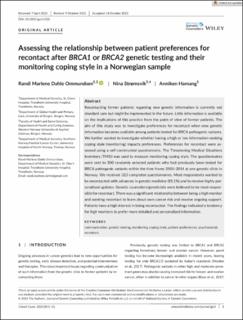| dc.contributor.author | Ommundsen, Randi Marlene Dahle | |
| dc.contributor.author | Strømsvik, Nina | |
| dc.contributor.author | Hamang, Anniken | |
| dc.date.accessioned | 2021-11-03T10:43:54Z | |
| dc.date.available | 2021-11-03T10:43:54Z | |
| dc.date.created | 2021-11-01T08:44:23Z | |
| dc.date.issued | 2021 | |
| dc.identifier.issn | 1059-7700 | |
| dc.identifier.uri | https://hdl.handle.net/11250/2827549 | |
| dc.description.abstract | Recontacting former patients regarding new genetic information is currently not standard care but might be implemented in the future. Little information is available on the implications of this practice from the point of view of former patients. The aim of this study was to investigate preferences for recontact when new genetic information becomes available among patients tested for BRCA pathogenic variants. We further wanted to investigate whether having a high or low information-seeking coping style (monitoring) impacts preferences. Preferences for recontact were assessed using a self-constructed questionnaire. The Threatening Medical Situations Inventory (TMSI) was used to measure monitoring coping style. The questionnaires were sent to 500 randomly selected patients who had previously been tested for BRCA pathogenic variants within the time frame 2001–2014 at one genetic clinic in Norway. We received 323 completed questionnaires. Most respondents wanted to be recontacted with advances in genetic medicine (81.1%) and to receive highly personalized updates. Genetic counselors/geneticists were believed to be most responsible for recontact. There was a significant relationship between being a high monitor and wanting recontact to learn about own cancer risk and receive ongoing support. Patients have a high interest in being recontacted. The findings indicated a tendency for high monitors to prefer more detailed and personalized information. | en_US |
| dc.language.iso | eng | en_US |
| dc.publisher | Wiley | en_US |
| dc.rights | Attribution-NonCommercial-NoDerivatives 4.0 Internasjonal | * |
| dc.rights.uri | http://creativecommons.org/licenses/by-nc-nd/4.0/deed.no | * |
| dc.title | Assessing the relationship between patient preferences for recontact after BRCA1 or BRCA2 genetic testing and their monitoring coping style in a Norwegian sample | en_US |
| dc.type | Journal article | en_US |
| dc.type | Peer reviewed | en_US |
| dc.description.version | publishedVersion | en_US |
| dc.rights.holder | Copyright 2021 the authors | en_US |
| cristin.ispublished | true | |
| cristin.fulltext | original | |
| cristin.qualitycode | 1 | |
| dc.identifier.doi | 10.1002/jgc4.1526 | |
| dc.identifier.cristin | 1950023 | |
| dc.source.journal | Journal of Genetic Counseling | en_US |
| dc.identifier.citation | Journal of Genetic Counseling. 2021. | en_US |

